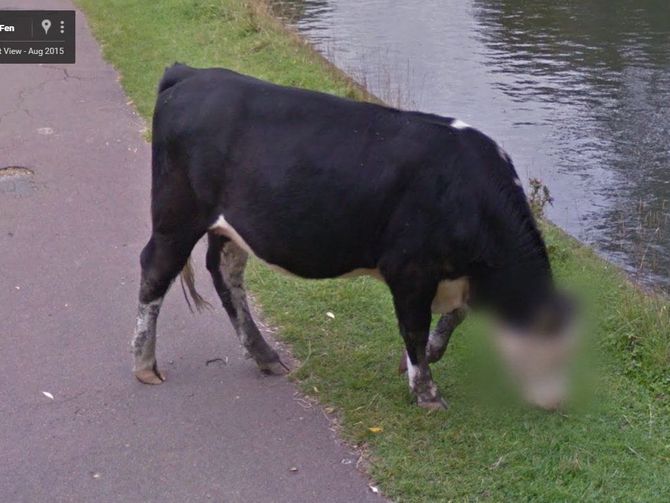It’s great news for camera-conscious cows! Google Street View is now blurring bovine faces. The privacy-related feature is intended to blur people’s faces on its Street View application, but the algorithm behind the blurring function seems to think that cows are people. Cowabunga!
Google is paranoid about its privacy policies, but things came to an indescribably hilarious head when its Street View blurred the face of a cow in Cambridge, England, in a photo taken on a farm.
When an editor for the Guardian spotted this snafu and published it on Twitter, Google quickly reacted with an equally funny official statement:
“We thought you were pulling the udder one when we herd the moos, but it’s clear that our automatic face-blurring technology has been a little overzealous.”
At least we know that our pets and cattle are save from privacy violations as far as Google is concerned. The Tweet in question had, of course, a ton of cow-based humor flooding it in response to the hilarious post, but this raises some serious questions about the privacy of animals.
Do Rover and Fido want to be seen on the internet without their permission? Will they sue others who take their photographs and publish them on the internet, now that Google supports face-blurring for animals?
All humor aside, though, face-blurring technology is a very useful tool. People don’t want the general public to know where they’ve been – well, unless they’re posting location-based photos on Facebook, that is.
The question of individual privacy in a wide-open world of technology is an interesting one. Does it constitute a violation of privacy rights when public places are photographed with people in them and those photos are later publicly circulated, for example? Where is the line that separates an ‘all clear’ from a ‘privacy violation’? Do legal departments now have to be even more wary of what their PR departments puts out?
The issue of personal privacy is not new, but the new forms of visual and imaging technology are stretching its limits, to put it mildly. Protecting the identity of an individual is no laughing matter, despite what the media says about camera-shy cows.
While we’re on the subject, let’s take Google’s Street View as the perfect example of this.
Ever since the launch of Street View feature in Google Maps, they’ve been facing legal problems in half a dozen countries. In 2011 France fined Google to the tune of approximately $142,000 for Street View-related privacy violations, and the company is now under a 20-year periodic mandatory audit requirement by the Federal Trade Commission, the FTC.
Personal privacy – or rather, the violation thereof – can be an expensive and strenuous affair. Notwithstanding the fact that $142,000 is peanuts for Google, the fines keep mounting and the negative PR is far more impactful. And this is not limited to photos and videos alone. Technology has opened up so many avenues for privacy violations that things are getting out of control. IP addresses, email IDs, phone numbers, social media user profiles, account information, sensitive data, medical image records, drug test results – the list goes on.
We don’t know where this issue will finally lead to, but we do know that privacy is increasingly coming under the microscope – as are the companies involved with the capture, processing, transfer and publication of the vast amounts of data that are now being created on a daily basis.
Technologies such as cloud computing and Internet of Things have exacerbated these problems, and with no one-size-fits-all solution within sight, the future certainly seems bleak.
On the other hand, maybe Google Chairman Eric Schmidt found the simplest solution when he said:
“If you have something that you don’t want anyone to know, maybe you shouldn’t be doing it in the first place.”
Let’s rephrase that: If you don’t want to be seen in public, don’t go out in the first place.
Is that the answer we’re going to end up with? Scary.
Thanks for reading our work! If you’re reading this on Apple News, please favorite the 1RedDrop channel (next to our logo) to add us to your news feed, or Like our page on Facebook. Please bookmark our site for more insightful articles on current and future technologies that are changing our lives.


